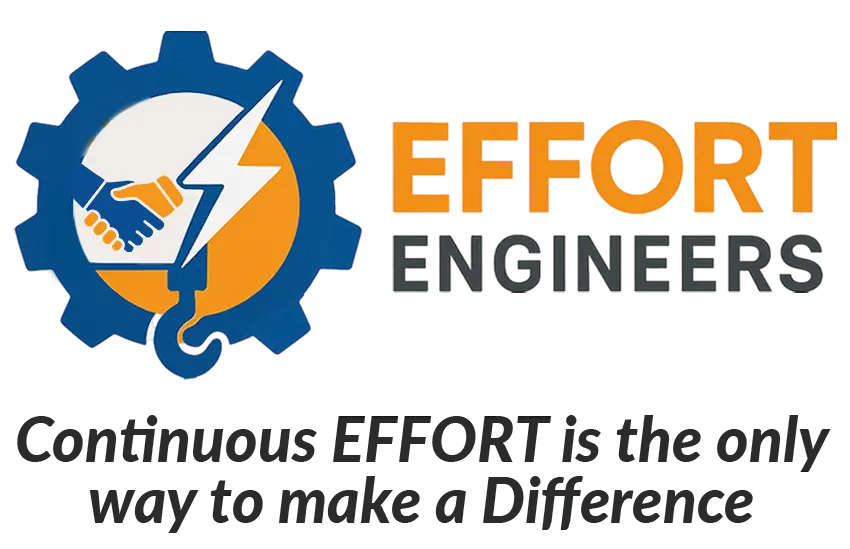Solar Energy Systems are transforming the way industries and households meet their power needs. As the world shifts towards renewable energy, solar power stands out as a sustainable, reliable, and cost-effective solution. In India, where energy demand is rapidly increasing, industries are increasingly adopting solar energy systems to reduce costs, lower their carbon footprints, and comply with sustainability standards.
At Effort Engineers, we specialize in designing and installing industrial solar power systems that deliver long-term performance, efficiency, and savings. This article will walk you through what solar energy systems are, how they work, their benefits, and why your business should make the switch.
What Are Solar Energy Systems?
A solar energy system is a setup that converts sunlight into usable electricity using solar panels and associated equipment. These systems are commonly known as:
-
Photovoltaic (PV) systems – Use solar panels to convert sunlight directly into electricity.
-
Solar thermal systems – Use sunlight to generate heat for water or air heating applications.
In industries, photovoltaic solar energy systems are the most widely used due to their efficiency and ability to supply large-scale power.
How Do Solar Energy Systems Work?
The working principle of a solar energy system is simple yet powerful:
-
Solar Panels (PV modules) capture sunlight.
-
Inverters convert DC electricity from the panels into AC electricity for use in equipment.
-
Batteries (optional) store excess power for backup.
-
Distribution Systems supply power to machines, offices, and other loads.
Why Industries Should Adopt Solar Energy Systems
Industries consume large amounts of power daily, making electricity one of the biggest operating costs. Here’s why adopting solar energy systems is a smart move:
-
Reduced Energy Bills – Significant savings on monthly electricity costs.
-
Sustainability & CSR Compliance – Meets green energy targets and reduces carbon emissions.
-
Energy Independence – Reduces dependence on the grid.
-
Government Incentives – Avail subsidies, tax benefits, and net metering.
-
Long-Term ROI – Solar systems often pay back investment within 4–6 years.
Types of Solar Energy Systems
Industries can choose from different types of solar systems based on their needs:
1. On-Grid Solar Systems
-
Connected to the electricity grid.
-
Excess energy is fed back to the grid via net metering.
-
Cost-effective for industries with a stable grid supply.
2. Off-Grid Solar Systems
-
Works independently using batteries.
-
Ideal for remote areas with no access to a grid.
3. Hybrid Solar Systems
-
A combination of on-grid and off-grid systems.
-
Provides power even during outages.
Benefits of Solar Energy Systems for Industries
Implementing solar brings multiple long-term benefits:
-
Lower Operating Costs – Cut electricity bills by 50–80%.
-
Predictable Energy Costs – Hedge against rising power tariffs.
-
Low Maintenance – Requires minimal upkeep with regular cleaning and inspection.
-
Scalable – Can be expanded as power requirements grow.
-
Improved Brand Image – Being seen as an environmentally responsible business.
How Effort Engineers Delivers Solar Energy Solutions
At Effort Engineers, we provide comprehensive solar energy solutions tailored to the needs of industries and commercial establishments.
Our services include:
-
🔹 Feasibility study and energy audit.
-
🔹 Custom design of solar energy systems.
-
🔹 Supply and installation of high-efficiency solar panels and inverters.
-
🔹 Integration with existing power systems.
-
🔹 Long-term AMC Services for reliable performance.
👉 Check our Contact Page to discuss your solar project today.
Internal Links for Better Navigation
Conclusion
Solar Energy Systems are no longer just an option—they’re a necessity for industries aiming to cut costs, reduce carbon emissions, and secure long-term energy independence. With the right system in place, businesses can achieve substantial savings and a strong competitive edge.
At Effort Engineers, we bring proven expertise in delivering custom solar solutions that match your operational needs.

Why Does Your Industry Need.
EOT Crane Maintenance Service is a crucial aspect of modern industrial operations, ensuring the safety, reliability,.

What Are PCC Panels and.
PCC Panels (Power Control Center Panels) are the backbone of electrical distribution systems in industries. These.




